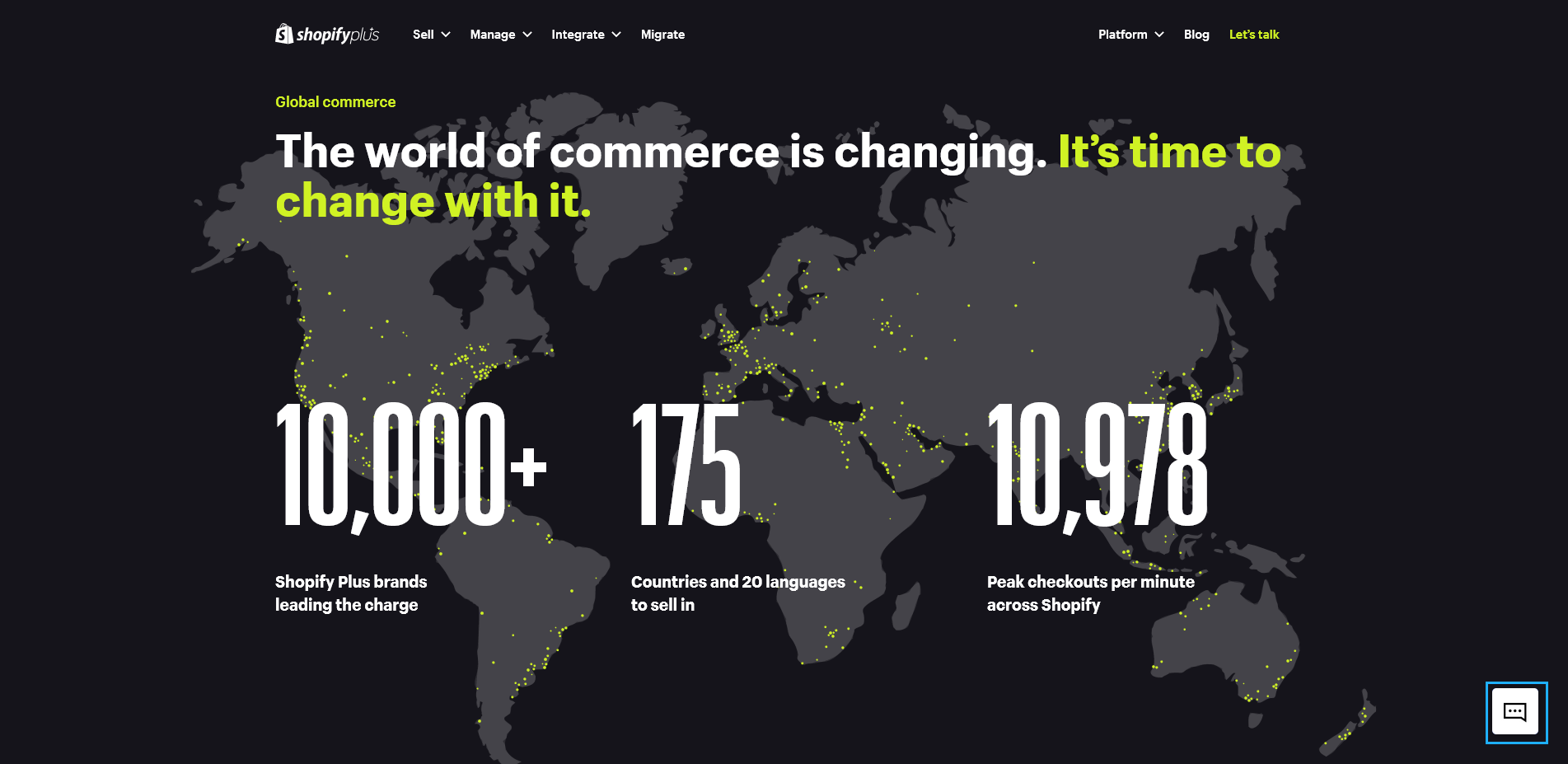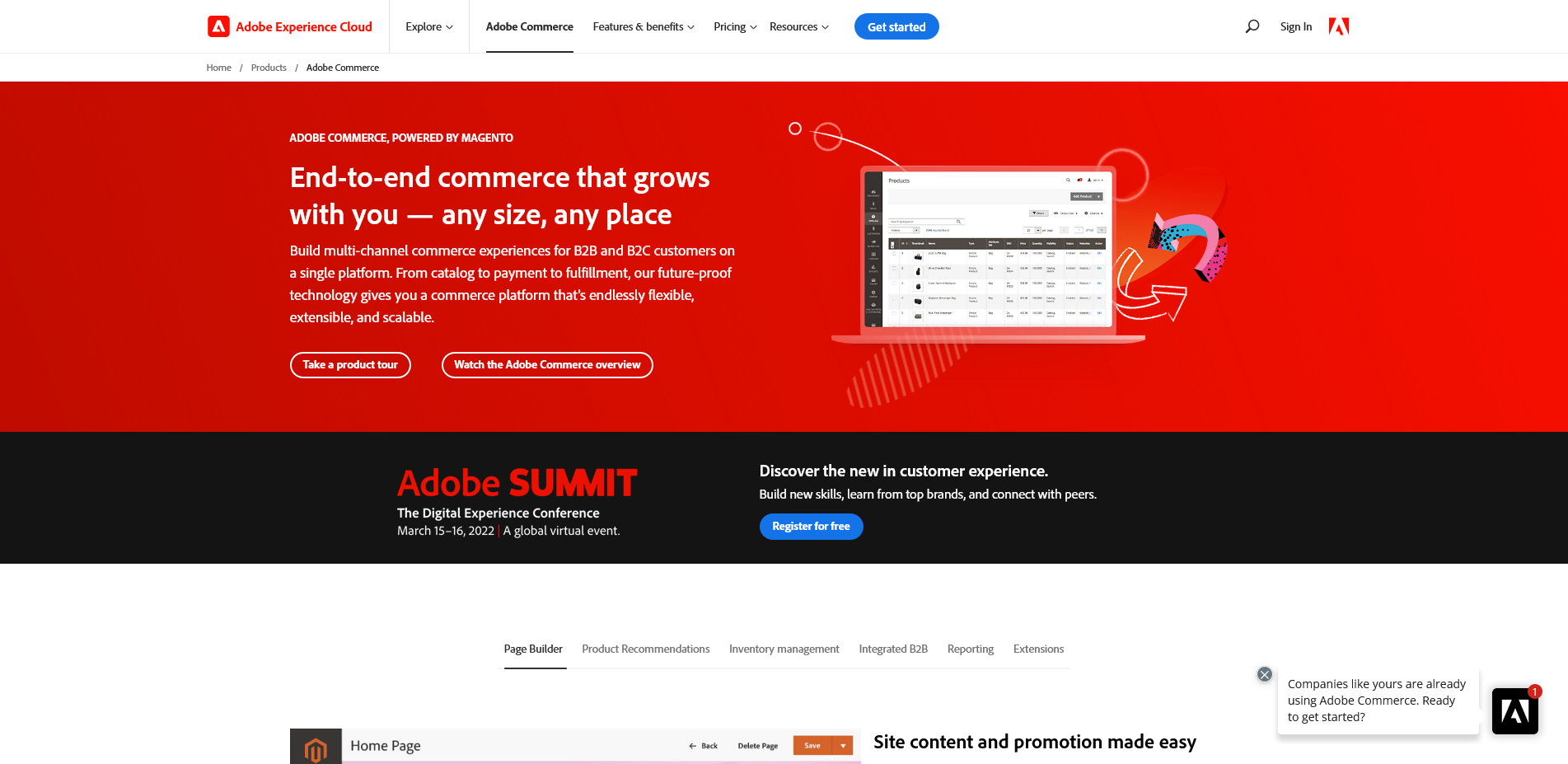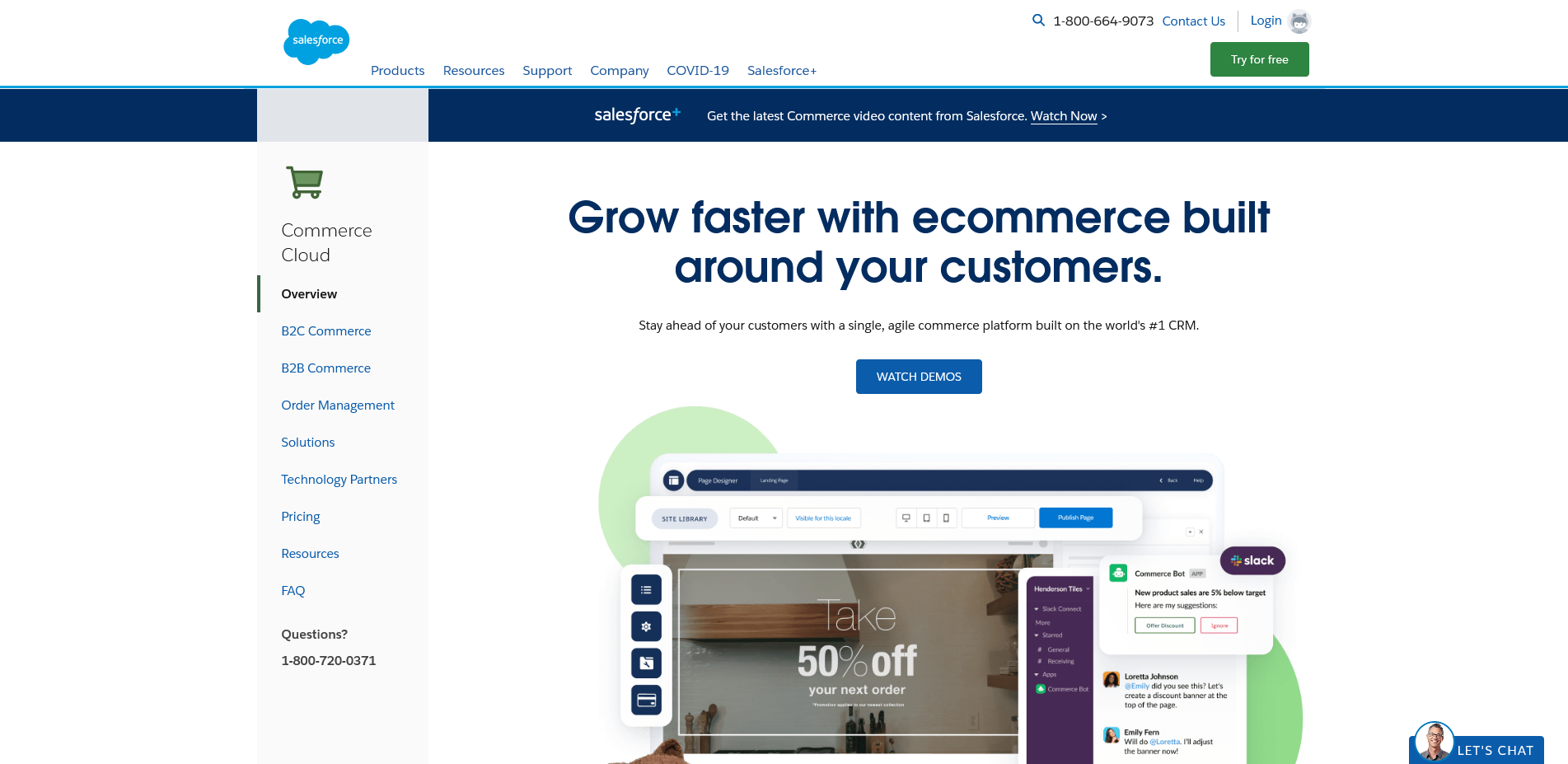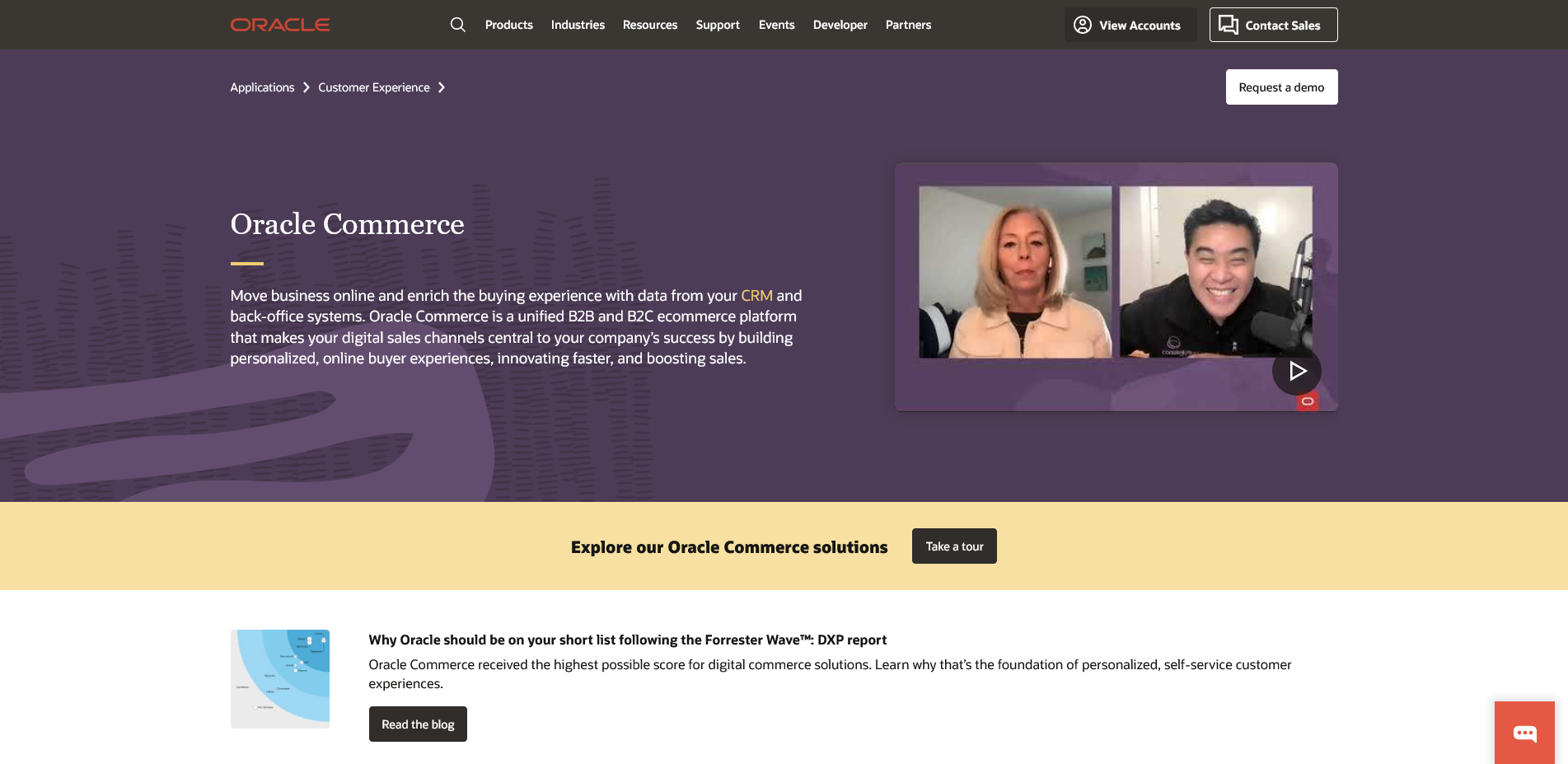The 5 Best Enterprise Ecommerce Platforms For 2024
As ecommerce businesses scale, many find that they outgrow the platform that has served them in years gone by and they need to find a new one that can handle their growth.
Downtime, speed issues, a poor user experience, lack of security, and a clunky backend will eventually kill an ecommerce business. If there are signs of that happening in your business, 2022 could be time to check out an enterprise ecommerce platform.
If you’re trying to build multi-million-dollar revenues and a global presence, with multiple products and services managed from multiple locations, an enterprise ecommerce platform could be what you need—but your choices of platform are limited.
Only a few ecommerce platforms can handle complex businesses with a large volume of transactions, a variety of products, and so on, while also remaining affordable.
We think the following are the best five enterprise ecommerce platforms for 2022…
Shopify Plus
Over 10,000 brands use Shopify Plus, as a testament to its increasing domination in the marketplace. Upgrading from one of the standard Shopify plans to Plus is relatively straightforward and the Shopify team also helps facilitate a smooth migration from other platforms.
Shopify Plus uses the same dashboard and editor as the standard plans but you can do more customization with it and have more control over how it is set up. The simple-to-use drag-and-drop page builder is a standout feature.
The starting price point of $2,000/month will deter some stores from making the move too early but if you can justify the extra costs, you will certainly notice the improvement in performance and functionality.
Shopify Plus is used by popular enterprise brands such as Chubbies, Leesa, Allbirds, Gymshark and Heinz.

Main strengths
- More affordable than hiring a web development agency or hiring an in-house programming team
- Dedicated account manager and 24/7 support
- Capacity for a high volume of transactions (up to 10,000 transactions per minute on the Shopify platform)
- A fully hosted and secure solution
- Huge ecosystem of over 1500 plugins to add functionality, improve user experience and promote your store
Main weaknesses
- Monthly costs can mount if you also use a lot of paid plugins/apps
- Not as many built-in tools as some of the other enterprise platforms
- Because it is a fully hosted solution, flexibility/customization is limited without hiring a Shopify developer (extra costs)
BigCommerce

BigCommerce is another of the major ecommerce platforms geared up for enterprise-level brands as well as smaller stores.
In addition to its “Essentials” offering for up-and-coming stores, BigCommerce has an Enterprise platform for established, growing companies looking to engage in multi-channel selling.
This provides a robust enough platform to handle high sales volumes and accommodates many integrations (or access to API for your developers).
It also has more built-in features than Shopify, which means that you spend less time (and money) researching, installing and integrating third-party apps.
The pricing model for enterprise is based on sales volumes so the more you sell each month the more you’ll pay. For an estimate of what it will cost you, you’ll need to request a custom quote from BigCommerce. At an absolute minimum, it will be $400-500/month
BigCommerce is used by popular enterprise brands such as Sony, Ben & Jerry’s, Skullcandy, Bliss, QVC, and Paul Mitchell.
Main strengths
- Many inbuilt features
- Designed for multi-channel, cross-channel selling
- Staging development environment
- Custom filtering options
- Dedicated account manager and priority support
- Many payment gateways available
Main weaknesses
- May be expensive for very high-volume stores (pricing based on sales volume)
- Contract required
- Some reports of inconsistent page-load speeds
Magento Commerce

Magento Commerce is now officially known as Adobe Commerce powered by Magento or simply Adobe Magento Commerce.
Adobe took over Magento in 2018 and has thrown its weight behind an already impressive and established enterprise offering of open-source, store-building software.
Magento Commerce is a self-hosted solution that provides complete freedom to build the store that you want—but it requires a high degree of technical skill and usually an in-house development team or hired contractors.
Features include a drag-and-drop design page builder, fast checkout with previously-stored payment and shipping information, and product suggestions features.
Pricewise, you are looking at a Magento licensing fee of around $1,988 per month. On top of this, you may have costs associated with hosting/domain name and website development…this could easily add up to tens or even hundreds of thousands of dollars.
So, if you are looking for excellent creative control, flexibility and scalability, Magento Commerce may be a good option, but you can expect to pay for it.
Magento Commerce is used by popular enterprise brands such as Toyota. Shoebacca, FoodService Direct, Rossignol, and HP.
Main strengths
- Flexibility – can create almost limitless custom designs from scratch
- Unrivalled number of integrations, providing creative control and options at every stage of your growth
- Many available features for skilled developers to utilize
- A very large developer community available to provide support
Main weaknesses
- Complexity—Magento is designed for web developers and a high degree of technical knowledge is required to produce the necessary code
- Requires hosting on another platform
- You incur other extra costs, such as paying for security certificates, domain name, etc. (which are included with Shopify and BigCommerce)
- Extra charges if Magento finds vulnerabilities in your code during a security check
- Need to migrate to the updated version every few years, which is time-consuming and expensive
- Some reports of a decline in performance with high transaction volumes
Salesforce Commerce Cloud

Commerce Cloud (formerly Demandware) is a U.S. ecommerce solution that was acquired and renamed by Salesforce.
As its name suggests, the platform is cloud-based. It provides a unified approach to ecommerce with mobile-first point-of-sale (POS), omnichannel selling, and AI-based predictive intelligence.
The platform is geared towards large enterprises and provides complete order management capabilities. It offers related services for B2C and B2B brands from a centralized dashboard across social media channels, mobile stores, and brick-and-mortar stores.
Commerce Cloud provides insights about customer shopping behavior through its sophisticated reporting system and has a personalization engine called Einstein. This helps to personalize the user experience when shopping in your store.
The enterprise-level version of Commerce Cloud is reserved for brands with more than five online stores.
Its pricing model is based upon sales volume and there are versions for both B2C and B2B. Enterprises generally pay between one and two percent of sales but this will need to be confirmed after a consultation.
The platform is currently used by popular enterprise brands such as Adidas, L’Oreal USA, Beats by Dre, and Otterbox.
Main strengths
- International compatibility – easy to manage multiple stores centrally and accept multiple currency types with different languages used in each store
- Easy to integrate the platform with the Salesforce CRM to manage customer relationships effectively
- Excellent customer support team available 24/7
- System upgrades do not impact your time (cloud-based)
Main weaknesses
- Technical web development skills required, unlike with Shopify Plus or BigCommerce
- Pricing can be expensive for stores with a high volume of sales
Oracle CX Commerce

Oracle’s CX Commerce offering is a cloud-native, fully-featured, scalable ecommerce solution, that utilizes the Oracle Cloud and can easily integrate with the Oracle CRM.
This can enhance the user experience because data from your CRM and back-office systems can help to personalize the buying cycle.
In this respect, it has similarities to the Salesforce Commerce Cloud and also with the SAP offering (Hybris)
The platform also supports both B2C and B2B models in one unified ecommerce platform for enterprise, just like the Salesforce CRM does.
Pricing, however, is not for the faint-hearted and starts at $150,000.
The Oracle CX Commerce platform is currently used by enterprise brands such as Dollar Tree, Shop Direct, Zema, and Zodio.
Main strengths
- Very strong on the mobile shopping experience
- End-to-end management of orders and the back end for multiple stores from one central location
- Very scalable solution from an industry powerhouse – the sky’s the limit as you grow
- Integrations with apps outside of the Oracle product suite make it easier to create a more efficient and cost-effective business workflow
Main weaknesses
- Price can be a major drawback for some enterprises
- Lack of integration with Amazon, eBay and other popular online marketplaces
- No single-click checkout
- Get the platform right and grow seamlessly
Best Enterprise Ecommerce Platforms
Whether you’ve outgrown your current ecommerce platform or been with an enterprise platform for a while and want a change, it helps to know what the biggest and best enterprise ecommerce platforms can offer.
Each of the five enterprise platforms above offers impressive uptime, speed, functionality, customizability, security, support, and scalability.
As ecommerce continues to become more competitive, your choice of platform is increasingly going to affect your success, impacting both user experience and the ease with which you can manage your business.
You can save a lot of work and upheaval in the future by finding the right enterprise platform early in the game.
